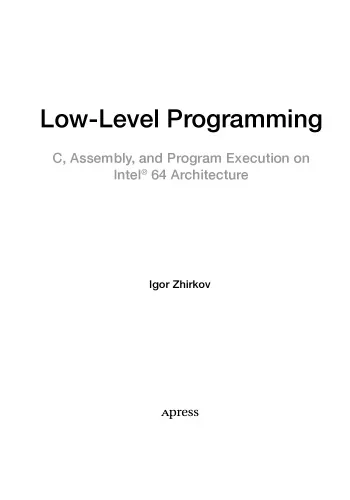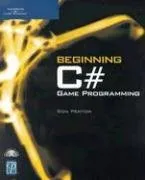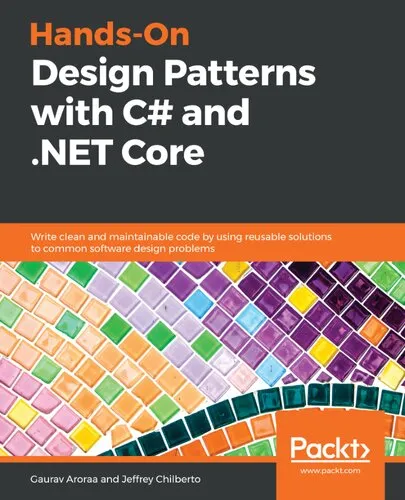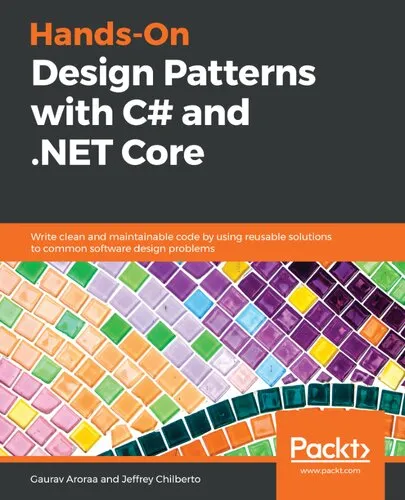Low-Level Programming. C, Assembly and Program Execution on Intel ® 64 Architecture
4.5
بر اساس نظر کاربران

شما میتونید سوالاتتون در باره کتاب رو از هوش مصنوعیش بعد از ورود بپرسید
هر دانلود یا پرسش از هوش مصنوعی 2 امتیاز لازم دارد، برای بدست آوردن امتیاز رایگان، به صفحه ی راهنمای امتیازات سر بزنید و یک سری کار ارزشمند انجام بدینکتاب های مرتبط:
کتاب "Low-Level Programming: C, Assembly and Program Execution on Intel ® 64 Architecture" اثری است که به صورت جامع و دقیق به بررسی موضوعات سطح پایین برنامهنویسی میپردازد و خوانندگان را با جزئیات اجرای برنامهها در معماری Intel 64 آشنا میسازد. نوشته ایگور ژیرکوف، این کتاب منبعی کلیدی برای کسانی است که قصد دارند دانش عمیقتری از نحوه عملکرد کامپیوترها پیدا کنند.
خلاصهای از کتاب
این کتاب با هدف فراهم آوردن دیدی عمیق و فنی از برنامهنویسی سطح پایین نوشته شده است. موضوعات پوشش داده شده عبارتاند از:
- زبان C و اصول آن به عنوان زبانی مؤثر برای برنامهنویسی سطح پایین.
- معماری Intel 64 و جزئیات آن که شامل طراحی CPU، رجیسترها، و حافظه ها میشود.
- Assembly programming و چگونگی استفاده از امکانات سختافزاری برای بهینهسازی کدها.
- تجزیه و تحلیل اجرای برنامه و درک فرایندهایی مانند کامپایل، لینک و بارگذاری.
نکات کلیدی
از مطالعه این کتاب، خوانندگان به تواناییهایی از قبیل:
- درک چگونگی ترجمه کدهای سطح بالا (High-Level) به Instructions ماشین.
- توانایی بهینهسازی برنامهها با استفاده از تکنیکهای Assembly و توجه به معماری Intel 64.
- تسلط بر مفاهیم پایهای مثل Memory Hierarchy، و نحوهٔ بهرهبرداری بهینه از Cacheها.
- فهم عمیق از عملکرد کامپایلرها و فرایند اجرای برنامهها.
نقلقولهای معروف از کتاب
"برنامهنویسی در سطح پایین توانایی است که به شما کنترل کامل بر روی اجرای برنامه میدهد."
"برای درک بهتر عملکرد یک سیستم، تنها نباید به زبانهای سطح بالا تکیه کرد؛ شناخت صحیح از ساختار زیرین ضروری است."
چرا این کتاب اهمیت دارد
اهمیت این کتاب در این است که به متخصصان فناوری اطلاعات، دانشجویان و برنامهنویسان کمک میکند تا درک عمیقتری از نحوه عملکرد واقعی برنامهها در سختافزار پیدا کنند. با توجه به پیچیدگیهای روزافزون سیستمهای محاسباتی، تواناییهایی که این کتاب فراهم میآورد، به شدت در صنعت مورد نیاز است.
علاوه بر این، اعتماد به نفس در برنامهنویسی سطح پایین و به کارگیری تکنیکهای بهینهسازی دستیابی به عملکرد بیشتر در نرمافزارها را ممکن میسازد. این کتاب به دلیل روشنی و جامعیتی که دارد، به عنوان یک منبعجدی برای کسانی که تمایل به تخصص در این حوزه دارند، پیشنهاد میشود.
Welcome to the comprehensive introduction to "Low-Level Programming. C, Assembly and Program Execution on Intel ® 64 Architecture". This book serves as a detailed guide for anyone interested in understanding what happens under the hood of modern software applications. It is a deep dive into the world of low-level programming, with a focus on C programming and Assembly language, specifically tailored to the Intel 64 architecture. Designed to bridge the gap between high-level programming concepts and the machine-level understanding, this book is indispensable for programmers, developers, and computer science enthusiasts.
Detailed Summary of the Book
"Low-Level Programming" offers a meticulous exploration into how software interacts with hardware. Beginning with fundamental concepts, it gradually ascends into more intricate topics, offering readers the necessary knowledge to write efficient C code and understand the corresponding Assembly representations. The book covers a wide array of topics such as memory management, data structures, and system calls, all within the context of the Intel 64 architecture. Throughout its chapters, the book provides practical examples and exercises to help solidify understanding and encourages readers to think about programming from a low-level perspective. Notably, this book also addresses the often overlooked aspect of program execution, enlightening readers on how to optimize their code for better performance and resource management.
Key Takeaways
After engaging with this book, readers will:
- Gain a solid understanding of the C programming language and its relation to Assembly language.
- Learn the intricacies of the Intel 64 architecture, including its instruction set and nuances.
- Grasp core concepts such as stack management, function calls, and memory allocation at a low level.
- Develop skills to write performance-optimized code by understanding what happens during program execution.
- Be equipped to transition from high-level programming to embedded systems and system programming roles.
Famous Quotes from the Book
"The difference between a good programmer and a great one lies in understanding the system deeply and bending it to your will."
"In programming, knowing the 'what' is valuable, but understanding the 'why' transforms good code into excellent software."
Why This Book Matters
In the rapidly evolving world of technology, the demand for high-quality software that performs efficiently on modern hardware architectures is ever-growing. "Low-Level Programming" addresses this critical need by equipping readers with the in-depth knowledge necessary to create efficient programs. As software systems become increasingly complex, having an understanding of how software interacts with hardware becomes crucial not only for developing efficient applications but also for ensuring system security and reliability. By demystifying the layers of abstraction between high-level code and machine architecture, this book empowers readers with the insights needed to push the boundaries of what's possible in software development.
Whether you are a software engineer aiming to optimize existing systems, a student aspiring to grasp the underpinnings of computer science, or a curious mind fascinated by how machines work, this book is an essential addition to your library. It offers not just knowledge, but the tools to innovate and excel in a field that is foundational to the technological era.
دانلود رایگان مستقیم
شما میتونید سوالاتتون در باره کتاب رو از هوش مصنوعیش بعد از ورود بپرسید
دسترسی به کتابها از طریق پلتفرمهای قانونی و کتابخانههای عمومی نه تنها از حقوق نویسندگان و ناشران حمایت میکند، بلکه به پایداری فرهنگ کتابخوانی نیز کمک میرساند. پیش از دانلود، لحظهای به بررسی این گزینهها فکر کنید.
این کتاب رو در پلتفرم های دیگه ببینید
WorldCat به شما کمک میکنه تا کتاب ها رو در کتابخانه های سراسر دنیا پیدا کنید
امتیازها، نظرات تخصصی و صحبت ها درباره کتاب را در Goodreads ببینید
کتابهای کمیاب یا دست دوم را در AbeBooks پیدا کنید و بخرید
1432
بازدید4.5
امتیاز0
نظر98%
رضایتنظرات:
4.5
بر اساس 0 نظر کاربران
Questions & Answers
Ask questions about this book or help others by answering
No questions yet. Be the first to ask!
















